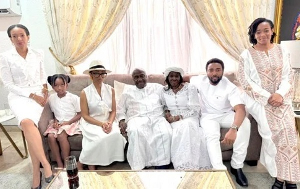Opinions of Saturday, 9 July 2016
Columnist: Nana Oye Odame
Friendly fire is the worst fire
There are a myriad of voices to be heard in a cemetery if you listen. There are contented sighs from people enjoying well deserved rest from their labors, gnashing of teeth by evil persons only remembered with curses, and the stunned unrest of people taken suddenly in sickness, accident, or disaster.
There is the oblivious peace of stillborn babies and dead infants who escaped the corruption of the world albeit unbeknownst to them; and the tormented wails of vengeful souls longing for a justice they were denied in life, and can only hope for in death.
Then there is, in the middle of it all, the confused, disbelieving frustration of people killed by misguided hands that meant well. Hands that tried to help the best they knew how, and ended up committing murder. Well, manslaughter. Or is it being accomplice to murder? What does that matter to the corpse? Such was the case with Aunty Gladys’ death – a death that stunned everyone in the neighborhood and beyond.
Aunty Gladys was a lady other ladies wanted to be and other men wished they were married to. A Wesley Girls’ High School (Gey Hey) product, she excelled in every sphere of life – she owned one of the best interior decoration businesses in the country, headed the women’s fellowship of her church, and was a model mother, extending her maternal milk to everyone who ever worked or studied under her.
The only place her excellence was called into question was as a wife. And that was solely because of the kind of man her husband was. Had I made this assertion before she died, several friends, family, and church members would have jumped to the man’s defense and suggested she was not pulling her weight as a wife, that her Gey Hey training had made her unsubmissive, ad infinitum.
Today, her death testified differently, vindicating the minority of her friends and family who had defended her and had been accused of encouraging bad behavior and being home wreckers. But it was a pyrrhic victory; an I-told-you-so one neither could, nor had any desire to utter.
Aunty Gladys died in a murder-suicide by her husband who had been begged to take her back after she was discharged from the hospital following a beating he had given her. It was not the first time he had beaten her. But it was the most severe, and the one that had garnered the most public attention. The pastor of their church had even begged him to kill a goat and have a party for her to tell the public that he loved his wife. That was the first time he had ever suggested the man had any responsibility in the beatings.
The beatings started a year or so after her first pregnancy where she had delivered twins, and the financial demands of having twins, coupled with the collapse of her husband’s first business had forced her to reenter the labor force. She had stopped working three months after they got married because they did not need the money, and she loved spending the time decorating and furnishing their new home. Besides, she got pregnant soon afterwards and being an extremely difficult pregnancy, was glad to not have to worry about maternity leave, etc.
Unfortunately, her husband’s business went under in her eight month and when the twins turned one, there was no denying the fact that they would use a second paycheck. She started working at an interior decorating school as a receptionist during the week, and used her staff discount to attend their weekend sessions. Her husband was trying to set up a furniture business in Sunyani and was gone a lot. Work, school and motherhood helped keep her mind off his absence, and her mother moved in to help with the babies.
One Saturday, a young lady showed up while she was at school with a pregnancy she claimed was her husband’s. Her first beating came that weekend when her husband came home and she asked him about Adoley. It never stopped. The provocations varied from ‘What?’ to ‘wtf?’ He beat her when he came home from Sunyani on an impromptu visit and got home to meet her absence because she was at church. He beat her when he closed early from work and got home to find no dinner on the table because she was still at work.
He beat her because he was drunk and unhappy about his life and her face annoyed him. She was a bad-luck woman. If he had married his first girlfriend, all this would not have happened. Sometimes, he beat her just because he could – the rage coming on like an African thunderstorm, seemingly out of nowhere, furious, and disappearing as quickly as it came. Her last beating, which took her to the hospital, was twenty-eight years later when all four kids had moved out of the house.
Her countless returns were fueled by societal expectations and advice by those who now felt responsible. First, they had urged her to stay for the children, then because God hates divorce. Then, because of her position as women’s fellowship president and the message her leaving her husband would send to the other women in the church. She had resigned after the last beating, and got herself an apartment, determined to leave this time no matter what it took.
Her new landlord was related to the pastor and when accused of invoking God’s wrath by aiding and abetting divorce, threw her out. Her return home had facilitated her family’s convincing her to give it one last shot, no idea it would be her last shot at anything, ever.
Aunty Gladys’ death is a testament to our patriarchal society where a woman who insults her husband is made to buy a fattened ram to apologize for disrespecting him, but a man who beats his wife is begged to take her back with schnapps by her own family who return her in shame when she goes home to seek refuge from the beatings. Now, I know there is a Papa Kojo whose wife abuses him and sympathize with him. We shall discuss his story at a latter date. Today, we contemplate Aunty Gladys’ story.
It draws light to the way we gladly hide behind religion and the laws in the bible which agree with our personal and cultural dispositions to turn our fellow (wo)man away when they come to us in need. It confirms our willingness to take the path of least resistance when it comes to conflict resolution. It is easier to reprimand our daughters for insubordination, than to tell our men off and demand they get professional help in managing their anger or jealousy.
Friendly fire is the worst fire. Yes, marriages/relationships require work and if everyone gave up at the slightest provocation, no one would probably make it past the first few months. But if a friend, family member or congregation member comes to us after being battered, we need be very careful what our input to the situation is. It may be the last time we ever advise them, and it may not be because they chose to stop coming to us for advice.
Have you been a victim, perpetrator, or observer of friendly fire? Share your thoughts and experiences!
Entertainment













